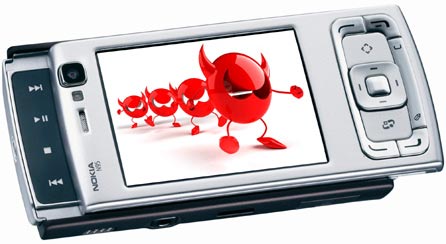Viruses are not only a threat to computers
Experts say mobile devices and smartphones are becoming more and more ' prey ' of the viruses, trojans, spyware .
In the past it was just a contagious disease on a computer, but now the number of viruses growing rapidly is moving into an area that has never been invaded: it's your smartphone.
Their list includes programs that can do everything from non-dangerous, like replacing your background with an image of an 80s pop star, to serious sabotage like stealing a PIN. your bank account.

In the past year, 257 new mobile viruses have been identified,
almost double the total of 2008.
" Today, mobile phones are part of our lives ," said Denis Maslennikov, a senior analyst at Kaspersky, one of the world's leading antivirus software manufacturers. ' But for hackers, these multi-functional devices have become the gold mine of personal and corporate data .'
According to Kaspersky, over the past year, 257 new mobile viruses have been identified, almost doubling the total in 2008. Mostly based on an increase in the number of smart phone users, malware, or code. Poisonous, expanding so fast that some of the industry leaders have named the year 2010 'The Year of Vius Mobile '.
Today's smartphones like BlackBerry, iPhone and many less popular models, mostly super-compact computers are also vulnerable to the same virus.
In 2009, Australian iPhones were unlocked, or ' broken down ', by an attacker called Ikee, which changed the phone's wallpaper to a picture of Rick Astley , a former pop star of Brother. Actually, it was not destructive, but it also proved that the attack was successful.
The same year, another fast-growing virus attacked smartphones on Symbian OS , one of the most widely used mobile platforms in the world. The virus spread through text messages, causing experts to worry because it easily bypassed the pre-installed antivirus software on many smartphones.
Faced with these threats, many companies that use smartphones as the main business tool are aggressively strengthening their electronic information security. A 2009 study by Goode Intelligence, a British consulting firm, found that 54% of companies in Europe and North America planned to deploy smartphone anti-virus software for the company.
However, according to the same report, 65% of organizations allow employees to use their own mobile phones for general work. This puts a large part of the burden on using secure smartphones on individual users who are increasingly becoming targets of malicious code.
In Egypt, about 40% of personal BlackBerry users, many check Facebook, pay bills with credit cards and email friends with smartphones. This means that hackers - who make a living by selling information - are craving for data memory to be filled in cell phones. Wanting to put their hands on it, they created a series of viruses that could invade smartphones and steal passwords, contacts and documents.
According to Maslennikov, other viruses directly steal better: They can make long distance calls that will make you pay a lot of money at the end of the month. Despite these threats, many users still do not know that their pocket handheld devices are also attacked like desktop computers.
When virus creators start earning money on malicious code activities, experts fear attacks will become more frequent, more widespread and more aggressive.
Users should ignore SMS and MMS spam messages, never access the links in those messages. Software installed on smartphones should be installed from a reliable website, ideally directly from the developer's website.
Bluetooth capabilities can also be a large backdoor to penetrate your smartphone. Never receive files from unknown devices via Bluetooth and minimize the amount of personal information stored in your device.